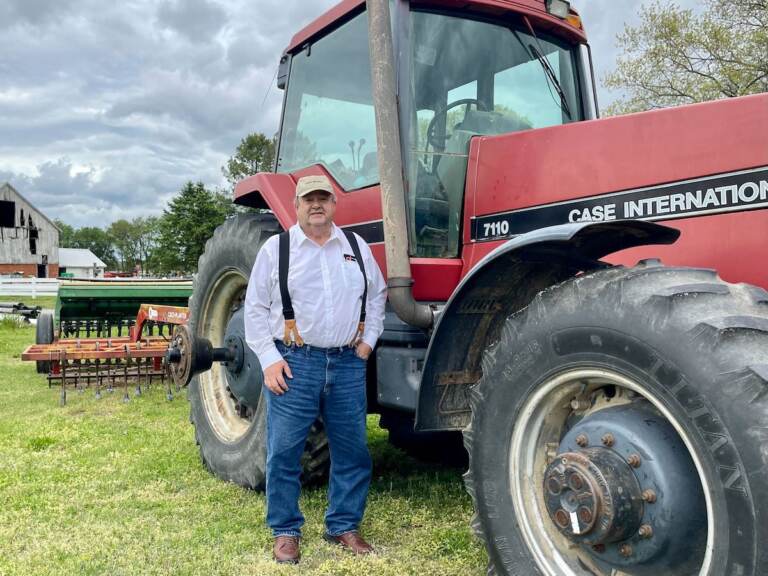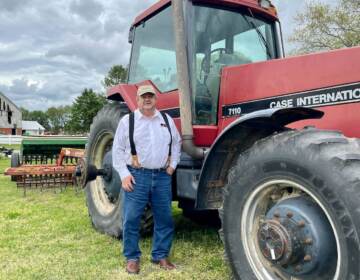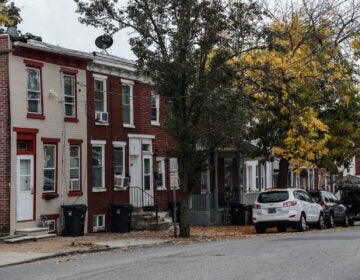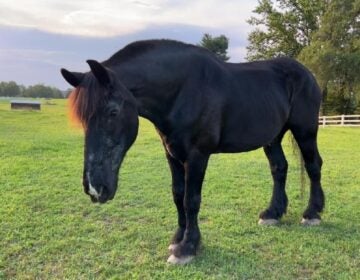In effort to balance growth and preservation, Sussex County acquires 165 acres of farmland
As Sussex County grapples with rapid population growth, officials have purchased 165 acres of farmland to preserve the region's agricultural heritage.
Listen 1:10
William Donald Clifton, a third-generation farmer of Clifton Farms Inc., tours his farm and shows different farming equipment in Sussex County, Delaware. (Johnny Perez-Gonzalez/WHYY)
From Philly and the Pa. suburbs to South Jersey and Delaware, what would you like WHYY News to cover? Let us know!
In Sussex County, Delaware, vast fields of corn and other produce stretch beneath endless skies, with country roads winding past historic barns and family farms. The pace is slow, and the land is rich with agricultural tradition, where farming still thrives as the heart of the community.
But efforts to maintain that rural landscape are being challenged as new developments rise.
Population has boomed in Sussex, with a 68% increase in population since 2000, according to the most recent U.S. Census data. So in an effort to keep the rural character, county leaders have acquired 165 acres of farmland to allow future generations to enjoy the county’s agricultural heritage.
“This particular property, which we are calling the ‘Layfield property,’ is just outside of the town of Dagsboro,” said County Administrator Todd Lawson. “This is about 165 acres of farmland and wooded land and it was purchased for $2.6 million dollars.”
County officials utilized real estate transfer tax reserves to finalize the purchase of the property from Riverview Associates III LLC, which was bought for more than $500,000 below the original sale price.
After thousands of trees were knocked down and limited land protections opened the door to development as thousands moved into the county, Lawson said they’re focused on balancing development with preserving the county’s character.
“It’s a balance between the development that you see in the county as well as the conservation efforts that the council has put forth as a priority,” he said.
This commitment to balance is exemplified by the Farmland Preservation program, which allows the county and state to purchase development rights of farms, enabling farmers to continue their agricultural practices. Additionally, the newly approved “perimeter buffer” ordinance will help preserve trees, further supporting the country’s conservation goals. It requires the county to consider minimizing tree loss when approving development projects, and developers are now required to install a 20-foot buffer of trees along the perimeter between new subdivisions and adjoining properties.
Sussex County Land Trust executive director Mark Shura said there was a lengthy acquisition process due to competing developers.
“This property came to our attention about a couple of years ago. It is a property that over the last couple of decades had been slated for residential development and it never quite gelled,” he said. “It’s a large piece of open space that has been tilled for decades and it was an opportunity to preserve that so we were very excited that we had that chance.”
Shura also raised concerns regarding the lack of agricultural zoning, which makes the county highly attractive to builders.
“It’s a challenge in Sussex County because the base zoning for the county is agricultural residential, which means that every parcel in the county can be built out for housing or a greater density. So with no true agricultural zoning, every piece of property is in play for development which makes our job very challenging,” he explained.
Moving forward, the Sussex County Land Trust will manage the newly preserved property and develop a master plan that could include recreational amenities or hiking trails. Meanwhile, it will continue to support agricultural production and enhance tree cover.

Get daily updates from WHYY News!
WHYY is your source for fact-based, in-depth journalism and information. As a nonprofit organization, we rely on financial support from readers like you. Please give today.








